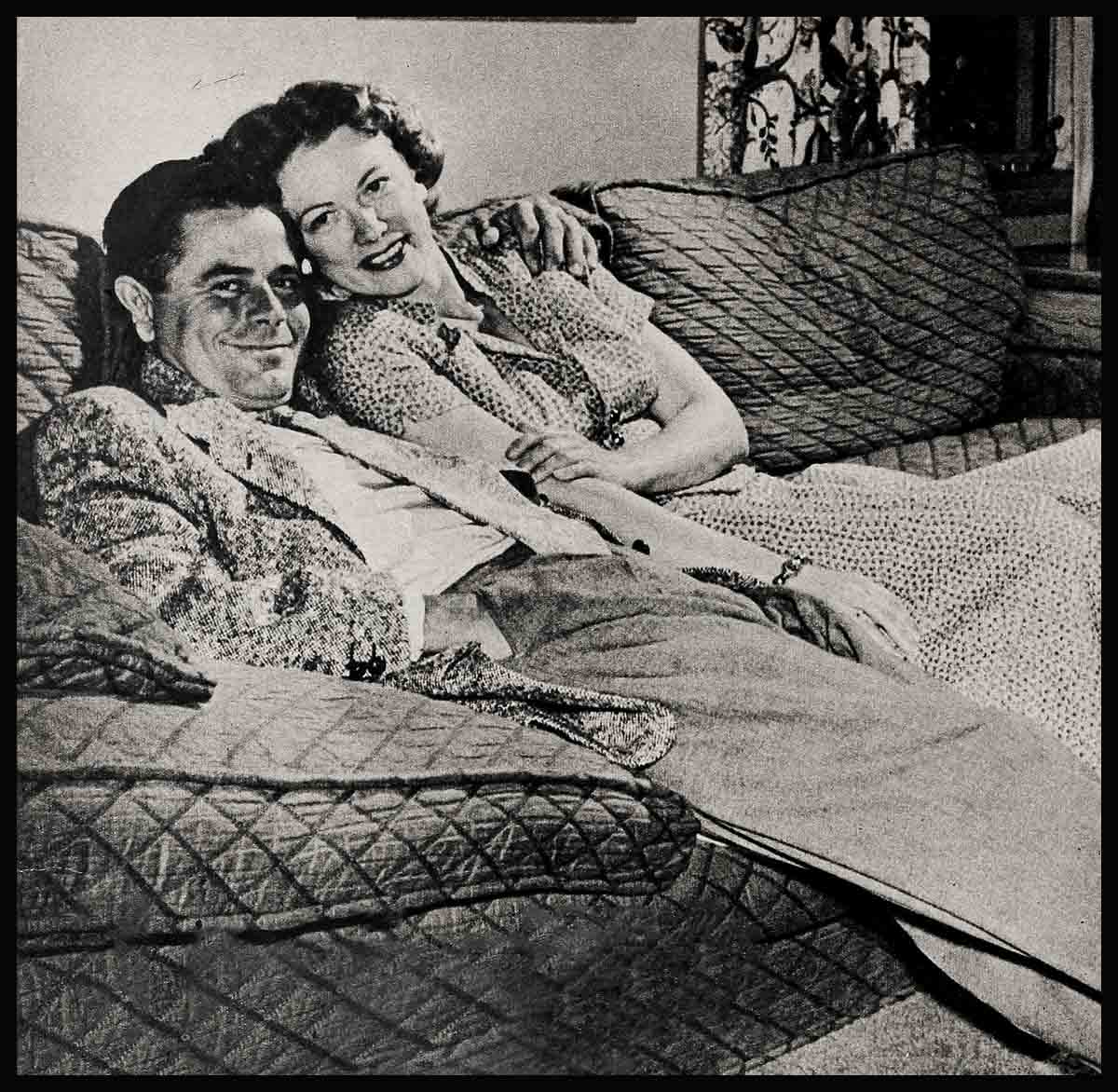
A Good Wife Is Hard To Lose—Glenn Ford & Eleanor Powell
Had you asked anyone-in-the-know a few years ago about the Glenn Ford – Eleanor Powell marriage, you would have been told, “Not so hot.”
Friends said divorce was imminent. They mentioned mother-in-law trouble, an overseas infatuation and too much foreign travel as the possible causes.
Today, however, as Glenn and Ellie approach their twelfth wedding anniversary (on October 23) theirs is one of the most secure and happy marriages in Hollywood.
“We’re so much in love,” cries Ellie Ford, “you’d think we were newlyweds.”
“I don’t know,” Glenn agrees, “when things have been better. I’ve just finished Trial; we sneaked it a few nights ago and it’s quite a good picture. I’m a happy man these days.”
What’s happened? What new and strange magic rescued a marriage teetering on the precipice of disaster?
Who and what changed Glenn Ford from a moody, frequently sullen and unfulfilled human being into a man of stature, warmth and good nature?
How come things are jumping in the Ford household these days?
To these many questions there are many answers, major and minor, but the two really important ones are love and religion.
Gwyllyn Samuel Newton Ford—Glenn to you—is a basically religious man.
It is significant, for example, that he proposed to Ellie in the old Methodist Church in Santa Monica. It was on a Sunday afternoon a dozen years ago. The church was empty. Glenn walked Ellie down the aisle and gently edged her into a pew.
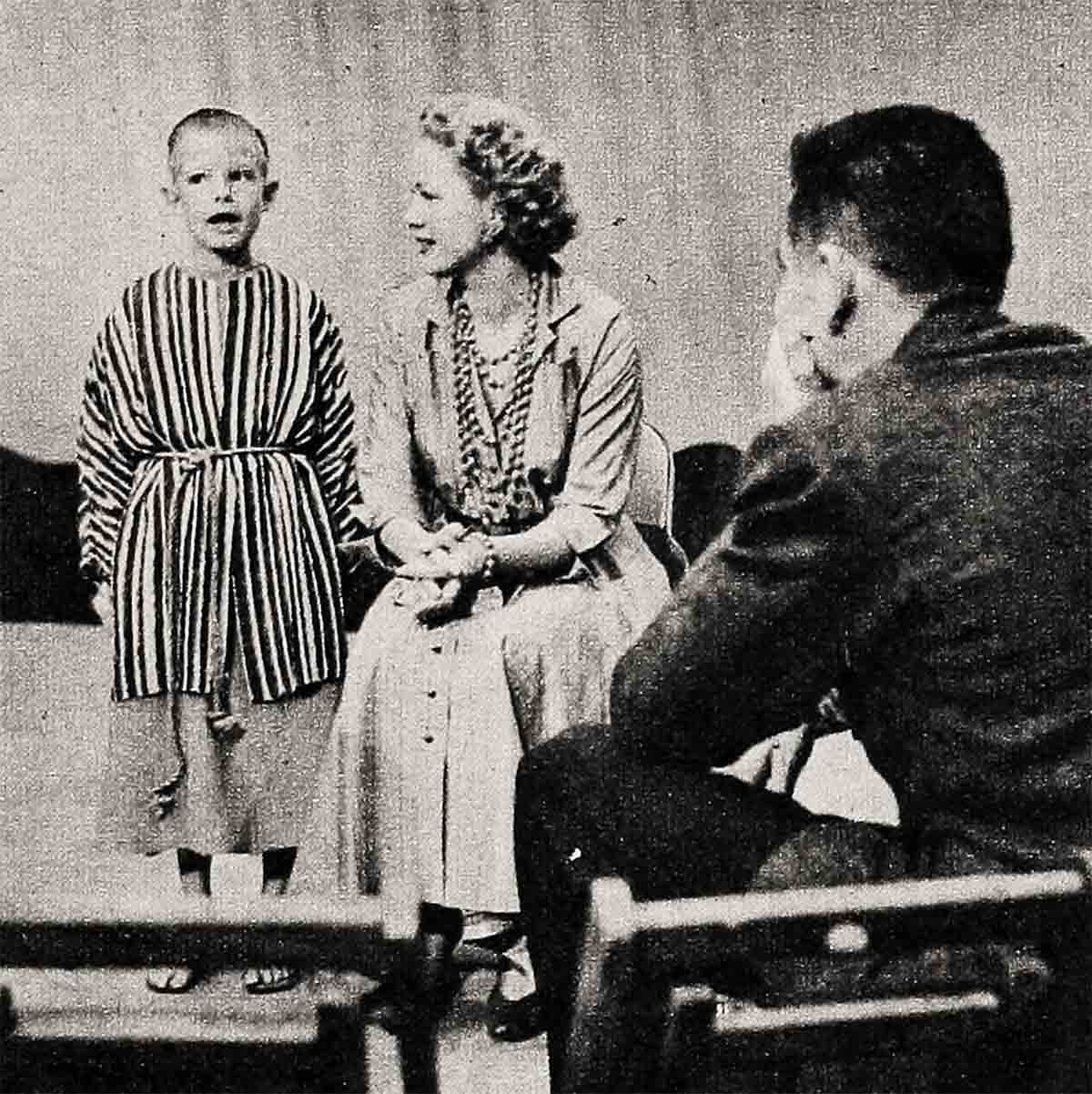
“This is where I’ve always attended services,” he said softly. “I wanted you to see it, Ellie.”
Eleanor Powell, the most famous tap-dancer of the decade, put her hand in his. “It’s a very nice little church.”
“I love you very much, Ellie. I want you to marry me. Will you?” The words tumbled quickly from the young actor’s lips.
Ellie nodded. Glenn took her in his arms. He kissed her long and hard. His fingers traveled down to the right hand pocket of his coat. He took out the engagement ring and slipped it on Ellie’s finger.
Glenn and Ellie are probably the only Hollywood couple who were both engaged and married in a church.
To Glenn there has always been something holy about love and marriage. He has never treated either very lightly. The mistake he made a few years ago was to take Ellie for granted.
This is no great crime. Married men do it all the time. They get so accustomed to having a wife answer the phone, take the messages, lay out the clothes, do the cleaning, pay the bills and look after the children that they forget the small niceties, the little private attentions every wife must have.
In addition, Glenn was working an awful lot overseas three years ago. At the time there was a lull in Hollywood production, and if an actor wanted work, it meant only one thing: work in Italy, France, England cr some other foreign country.
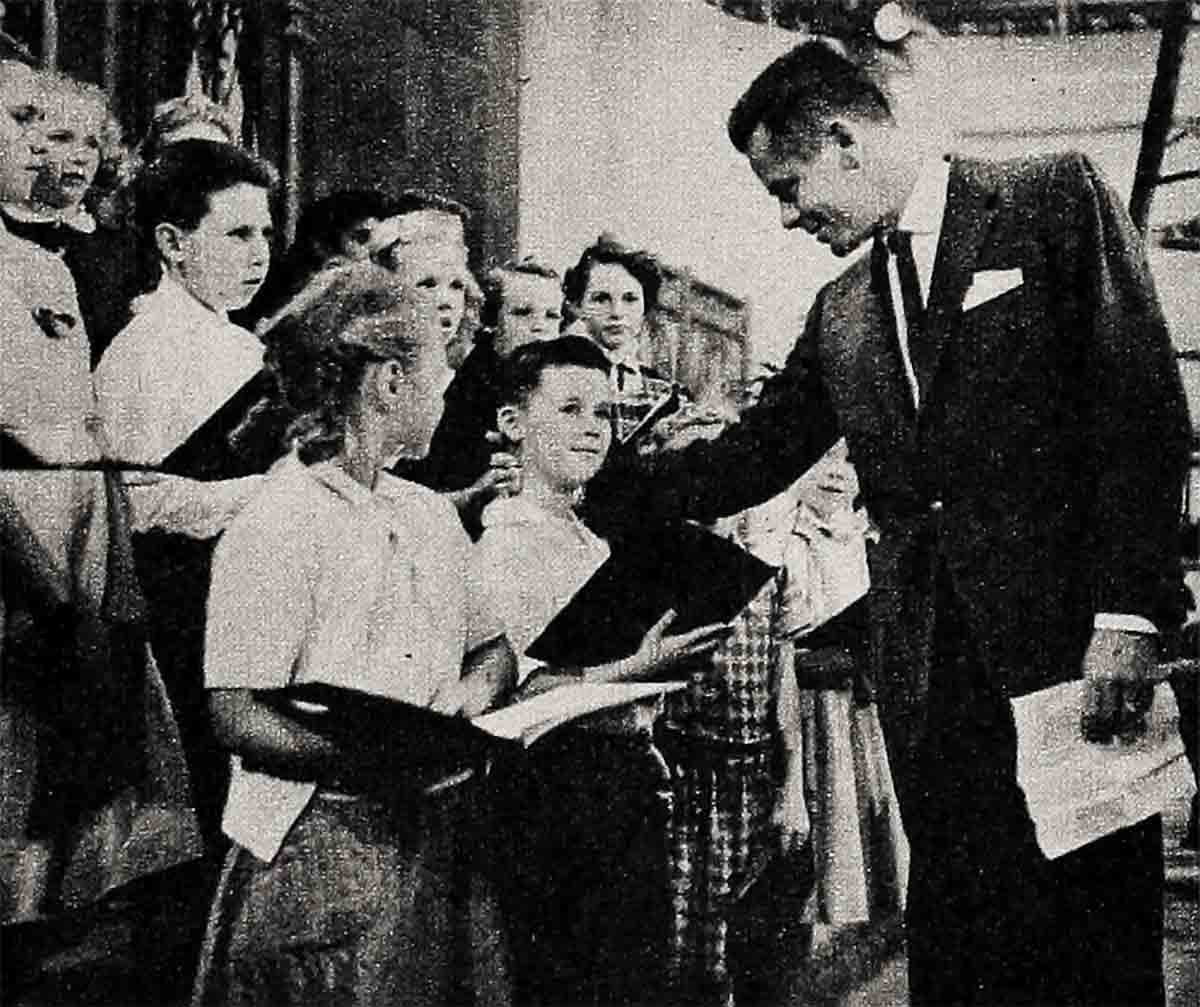
Glenn did The Green Glove in Paris and Time Bomb in London and White Tower in Switzerland. And there was talk, all of it unfounded, that the European sirens were throwing themselves at him.
Ellie says now, “I didn’t mind any of the gossip. It’s part and parcel of show business. It’s just that I was lonely with out him. I had our son Peter and Glenn’s mother to look after, and they kept me company. But there’s really no substitute for a husband.”
Friends say that when Glenn got home and pretty much took for granted that Ellie would be waiting for and on him as usual, she blew her top. He, in turn, grew sullen and moody. And it looked for a while as if both parties were fed up.
But then Glenn signed a deal to make The Americano in South America. This time Ellie decided to go along. She and Glenn and Peter, then nine, caught a tramp boat at New Orleans.
When the boat pulled into Rio de Janeiro there were signs on the pier, “Welcome to Rio de Janiero, Eleanor Powell. Rio greets Eleanor Powell.”
Waterfront reporters rushed Mrs. Ford. How long did she plan on staying? Did she know that her pictures were still playing all over South America? Did she realize that she was still one of the most popular Hollywood stars?
Ellie introduced Glenn Ford. “He’s going to star in a picture called The Americano,” she explained. “He’s my husband.”
“How do you do, Senor Ford?” The newsmen gave Glenn a quick brushoff. They were interested in his wife, not him. Glenn was more than a bit taken aback.
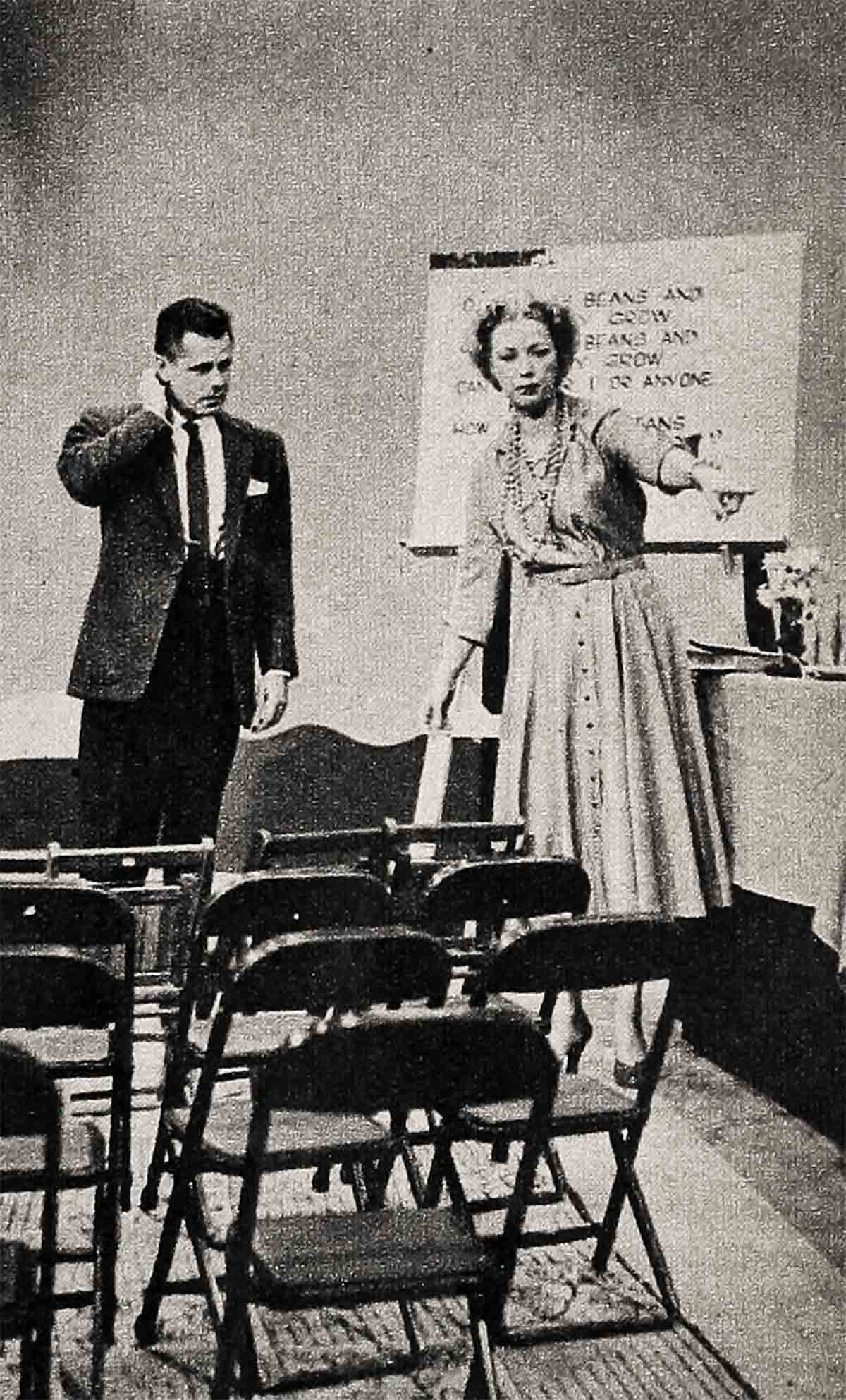
In Sao Paulo, the same thing happened.
On the beach at Copacabana this concentration on Ellie reached fantastic heights. “Each morning,” she recalls, “I would go down to the beach with Peter to catch a little sun.
“The very first day I was amazed when a boy came over to where we were sitting. He delivered a large bouquet of flowers. Attached to it was a card. It read, ‘You have the most beautiful figure I have ever seen. Is it possible for us to have a talk together?’ A few minutes later I received more flowers. Then men began coming over, began to make small talk, then serious talk. It was great for my ego.”
Day after day Ellie was stopped by male admirers on the streets of Rio. It made no difference to them that she was a married woman, that her son was with her. Some of their propositions “were alarming, to say the least. They told me not to worry about Glenn, he could take care of himself.”
Glenn could see what was happening. A member of The Americano troupe remembers. “The most amazing transformation came over the guy. He suddenly realized that he had one of the most sexy, beautiful, well-built wives in existence.
“Here were a thousand guys, many wealthy and handsome, who’d give a right arm for a date with Ellie. It came to Glenn that in some corners of the globe his wife was more famous, more desirable than he. She was loaded with charm, personality, tact, good looks and talent.
“Of course when Glenn married her, he knew all that, but over the years a man loses perspective where his old lady is concerned. Ford certainly regained his.
“All of a sudden he became possessive. Ellie belonged to him, and nobody was moving in. He became more attentive, more loving than I’ve seen him in years, and I don’t. think he’s stopped since.”
Ellie’s analysis is a bit different.
“When Glenn married me,” she points out, “I was a fairly big star. As a matter of fact I had been offered $40,000 for a three-week appearance at the Music Hall in New York. Instead of accepting the money I went off with Glenn to La Jolla. He had joined the Marines, and we rented an apartment over a garage—it cost $60 a month—and I did all the cleaning and cooking. And that’s how we spent the first year. I retired from show business.
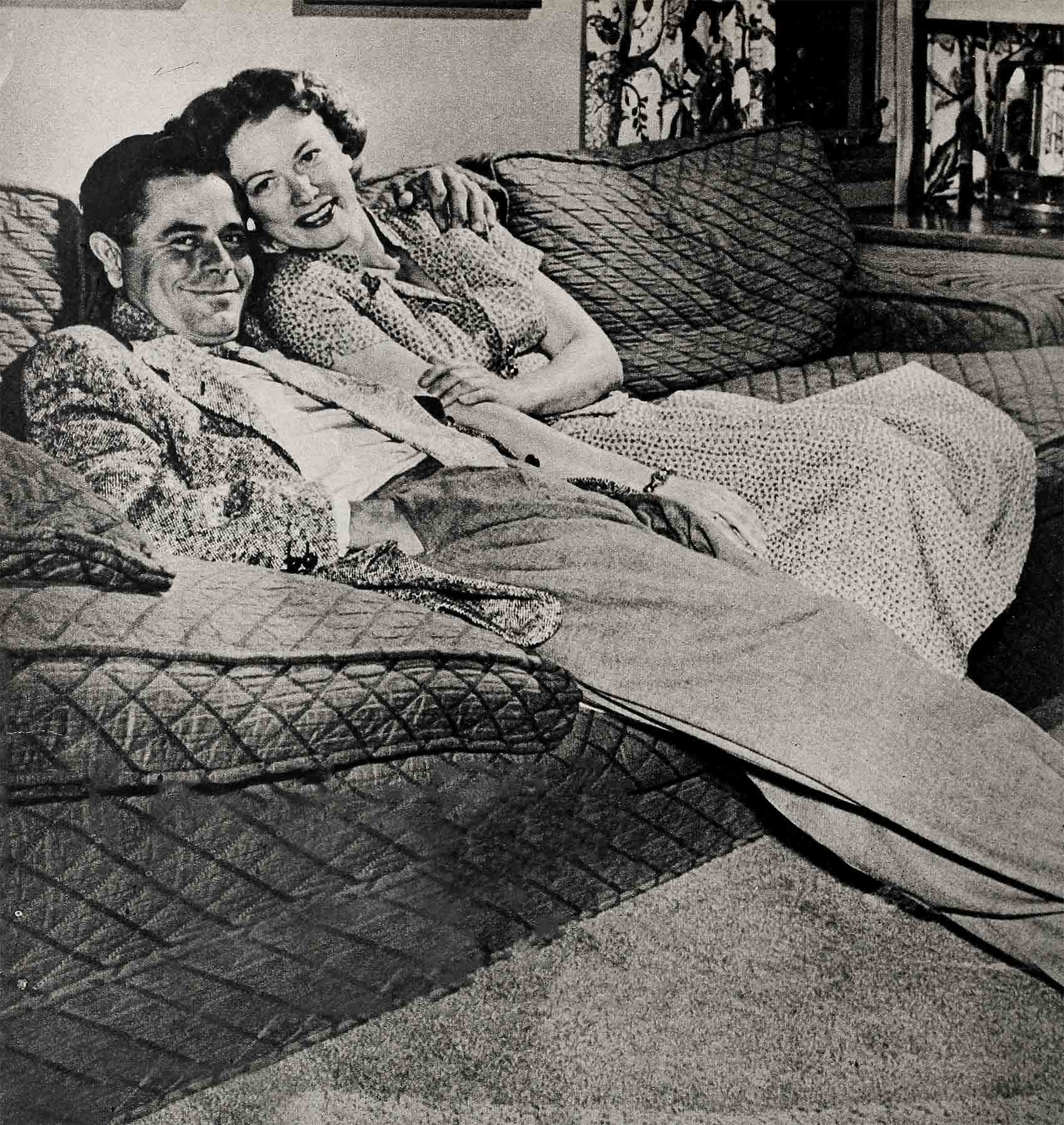
“Glenn didn’t ask me to retire. But I’d been in show business since I was fourteen. And I learned one thing. No woman is wise who dominates a marriage. The husband has got to be the leader.
“When the war was over and Glenn went back to pictures, he was not a top star. He struggled and he worked hard. And because he’s a fine, sensitive artist success for him was inevitable.
“As for me I was so happy when Peter was born—it opened up a brand new vista—I can hardly describe my feelings. Marriage, however, is not all excitement. And sooner or later things fall into a pattern. A husband begins to regard his existence as rather humdrum and boring. Where I was once the glamorous dancer, I guess I became ‘just good old Ellie.’
“I am sure that Glenn has never stopped loving me any more than I have stopped loving him. The love we feel for each other is deep and enduring. But like all love it occasionally needs a shot in the arm.
“Ours got one on that trip to South America. After those Romeos down there began making a play for me, Glenn sat up and took notice. Today he won’t take any Overseas jobs unless his family goes.
“The other saving grace in our marriage has been religion. Anytime you bring religion into a marriage you make it better. The TV show that Glenn and I put on each Sunday has brought more satisfaction and mutual respect than any other family project I can think of. Our son Peter, for example, isn’t impressed by Glenn’s standing as an actor. Doesn’t mean a thing to him. But the fact that his mother teaches Sunday School and his parents put the Sunday school class on television—well, we’ve reached new highs in his estimation.”
Eleanor Powell Ford started to teach a Sunday School class for children at the Beverly Hills Presbyterian Church in 1949.
“She came to us,” says Reverend Sam Allison, “with no fanfare, no fuss, no bother. She’s a girl who loves church work and has that rare faculty of arousing the interest of children. In six years I don’t think Ellie has missed a single class. She and Glenn and Peter are persons who give themselves and find pleasure in it.”
About a year ago Reverend Clifton Moore, who heads the local presbytery, said to Ellie at a meeting, “Do you know that there are thirty-five church programs currently broadcast and telecast throughout the nation? Practically all of them are beamed at adults. What we need is a religious program for children, for young people. I wonder if you’d be willing to teach your class on television?”
Ellie thought for a moment.
“I’m extremely flattered, Reverend Moore,” she said. “But I don’t think it would work, not with me, anyway. You see, I’ve been connected with show business. So many people feel that show business and regilion don’t go hand-in-hand.”
Reverend Moore insisted. “There are just as many,” he stated, “who think they do. Won’t you discuss it with Glenn?”
That night Ellie and Ford discussed the project in their living room.
“I think it’s a great idea,” Glenn insisted.
“Will you help me if I go ahead with it?” Ellie asked.
You know what Glenn’s answer was.
They called the program Faith Of Our Children, and they broke it in on KRCA, the key station of the NBC Pacific Coast network. That was in November of last year. This year the show is scheduled for complete network presentation.
Glenn and Ellie do all the work, the casting, writing and auditioning, together.
The program, a half-hour show, consists of a choir, visual Bible aids, participating children, and guest appearances by show people and sports stars such as Jane Russell, Jeanette MacDonald, Ralph Edwards, Bob Lemmon, Henry Armstrong and Bob Richards. They talk about their religious experiences, and the audience is enthralled.
Half of the children on the program are replaced each week, and those auditioned represent all the different faiths.
While the show is being telecast Glenn usually stands in the wings or the control room, occasionally supported by son Peter.
Glenn receives no pay for his work but Ellie receives in accordance with union regulations, $23.10 for each TV appearance. What’s left of her salary after taxes goes into the fuel fund to transport the children from the church to the TV station.
A friend of Glenn’s says, “I honestly believe that Ford gets a bigger bang out of that kid TV show than any picture he’s been in. Of course he won’t say that. But his enthusiasm for the program and his admiration of Ellie—you can read them in his eyes. This guy is so proud of his wife he’s going to bust wide open one of these days.”
When I checked this with Glenn, he grinned in agreement.
“She’s an altogether wonderful woman, wife and mother.”
As for Ellie, now that she’s on TV, she’s been bombarded with more show-business offers than ever.
Only a few weeks ago she was offered $10,000 a week for a series of personal appearances.
“I’m very sorry,” she politely told the booking agent. “There’s not enough money in the world to make me give up my church work or to leave my husband and son—not even for a little while.”
That’s how great things are over at the Glenn Ford homestead these days.
THE END
—BY RUTH LOUGHLIN
It is a quote. MODERN SCREEN MAGAZINE OCTOBER 1955




